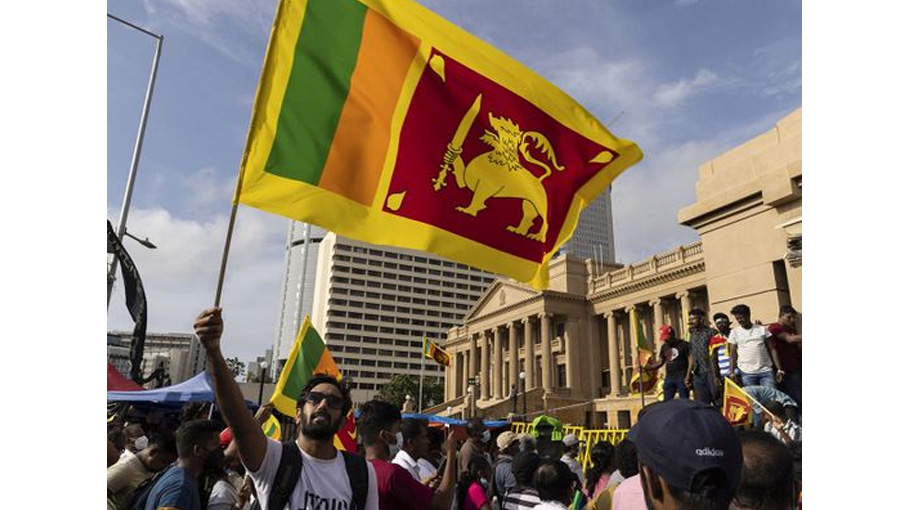A Gulf bailout for Sri Lanka?
The worst economic turbulence in seven decades has left it bankrupt to pay for imports

It is a rich country with two other names — ‘Pearl of the Indian Ocean’ because of its natural beauty and rich biodiversity; and ‘teardrop of India’ as it resembles a teardrop just off the Indian coast on a map. It is also one of the world’s oldest traditionally Buddhist countries; produces world class tea; and has some of the cleanest cities and the most literate people in South Asia, who constitute a significant expatriate community in the Gulf.
For these reasons and more, it is painful to see Sri Lanka in turmoil.
The worst economic turbulence in seven decades has left it bankrupt to pay for imports, including fuel and other necessities.
This crisis has brought vast numbers of Sri Lankans to the streets demanding accountability and an end to corruption and mismanagement.
Dismal as the situation currently is, there is hope for the future. Sri Lanka can recover even if it is likely to be a long and arduous journey. It has demonstrated resilience by overcoming separatism and terrorism and could come out of this crisis stronger than before.
However, it needs help, and needs it quickly, first to shore up its economy and finances and then to reform governing institutions. Even a modicum of economic recovery and governance reform should result in political stability and pave the way for a substantial recovery.
To confirm that such recovery is indeed possible, one does not have to look too far back in history. Failing or failed countries indeed rise again. In fact, many countries do not rise till they fail and the current crisis could be that turning point that the island country needs.
Rewind to the dire situation of the Thai, Indonesian and South Korean economies in the late 1990s. While other countries like Malaysia and the Philippines were also affected by the 1997 financial crisis, the foreign debt-to-GDP ratios of the three aforementioned countries went through the roof.
The International Monetary Fund (IMF) provided $120 billion in relief, with a proviso that their governments adopt strict regulatory policies, which were unpopular with the public, leading to political changes. Most of these Southeast Asian economies, whose fundamentals were stronger than Sri Lanka’s, recovered quickly nevertheless and are thriving now.
Not convinced?
India is another example. Its 1991 balance of payments crisis was triggered by a combination of factors, including the collapse of the Soviet Union, with which it had rupee exchange in trade, and the sudden rise in oil prices after Iraq’s invasion of Kuwait. The war increased the oil import bill and reduced remittances, hurting foreign currency inflow.
Failing or failed countries indeed rise again.
In fact, many countries do not rise till they
fail and the current crisis could be that
turning point that the island country needs
New Delhi was close to defaulting on its own financial obligations. After the IMF and World Bank refused to continue their assistance and set conditions, India mortgaged its hugely ‘emotive’ gold reserves to steady the ship.
The crisis, in turn, facilitated economic liberalisation, and its economic growth shifted gears, facilitated by constantly improving administrative reforms and governance mechanisms. To ensure that history does not repeat itself, its foreign exchange reserves, which was $1.2 billion in 1991, has been beefed up to $600 billion at present.
Whither Sri Lanka?
Apart from the IMF and even India, which is pumping resources to keep its neighbour afloat, can the Gulf countries offer help?
The Gulf countries have in the past bailed out and continue to help several countries in the Middle East, Africa and Asia — including Jordan, Lebanon, Yemen, Iraq, Egypt, Sudan, and Pakistan, among others. Even Oman and Bahrain have received assistance.
In addition, they have also provided official development assistance, direct aid and humanitarian assistance to dozens of other countries as part of their soft power strategy.
Like all assistance in the current geostrategic context, aid could be construed as a long-term investment. Sri Lanka recently flagged investment potential in the tourism, banking and government securities sectors, and to upskill Sri Lankans seeking employment in the Gulf. Renewable energy projects could be added to the list.
Thus, the “great reservoir of goodwill for Sri Lanka” in the Gulf countries must find new and practical synergies of turning the ongoing challenge into a fruitful future opportunity. The political churning underway should encourage the Gulf countries to feel that their assistance will not be wasted. And that Sri Lanka could indeed turn the corner, like other Asian countries have done in the past.
Dr N. Janardhan is Senior Research Fellow, Gulf-Asia Programme, Anwar Gargash Diplomatic Academy, Abu Dhabi, Non-Resident Fellow, Arab Gulf States Institute in Washington. Source: Gulf News



